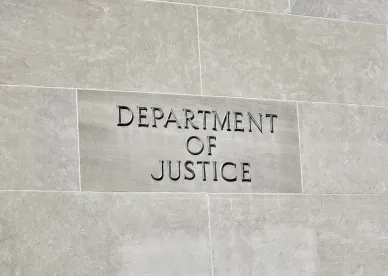Earlier this year, the U.S. Department of Justice (“DOJ”) released its highly anticipated Cryptocurrency Enforcement Framework (the “Framework”). The Framework was developed as part of the Attorney General’s Cyber-Digital Task Force, and contains three sections: (1) Threat Overview; (2) Law and Regulations; and (3) Ongoing Challenges and Future Strategies.
The “Threat Overview” section details various illicit uses of cryptocurrency and highlights how criminals increasingly have used cryptocurrency to fund illicit and illegal activities, including purchasing and selling illegal drugs and firearms, funding terrorist organizations, laundering money, and engaging in other illegal activities on the dark web. The Framework also discusses how hackers have targeted cryptocurrency marketplaces for theft and fraud activities.
The “Law and Regulations” section of the Framework details the existing statutory and regulatory framework that DOJ and others have used and can use to regulate cryptocurrency. As the Framework explains, DOJ is not the only enforcement actor in this space, and many other agencies – including, among others, the U.S. Treasury Department, the Securities & Exchange Commission, the Commodity Futures Trading Commission, and the Internal Revenue Service – have been actively enforcing violations by criminal cyber actors. While the Framework is generally supportive of a broad, multi-pronged enforcement landscape, it highlights the difficulty of tracking and complying with an increasingly complex web of regulations created by these various agencies.
The third and final section of the Framework discusses current challenges and strategies for future enforcement. This section notes the inherently decentralized and cross-border nature of cryptocurrency, and the problems it poses for enforcement. Though the global nature of cryptocurrency might complicate investigations, the Framework makes clear it will not hinder DOJ’s willingness or ability to prosecute cases, stating, “The Department also has robust authority to prosecute VASPs [Virtual Asset Service Providers] and other entities and individuals that violate U.S. law even when they are not located inside the United States. Where virtual asset transactions touch financial, data storage, or other computer systems within the United States, the Department generally has jurisdiction to prosecute the actors who direct or conduct those transactions.” The enforcement section emphasizes the Bank Secrecy Act (BSA) and Anti Money Laundering (AML) laws as primary tools of enforcement, particularly for actors who deal with “anonymity enhanced cryptocurrencies” and technology that obscures the ownership of particular assets. The report stresses that obligations to safeguard systems, protect consumer data, and properly maintain customer information apply not only to conventional virtual asset exchanges, but also to peer-to-peer exchanges, kiosk operators, and virtual currency casinos.
The DOJ released the Framework at a time when interest in cryptocurrency is at an all-time high. Bitcoin passed $20,000 recently, and the record-setting level is a clear indication of increased interest in the major digital asset. Cryptocurrencies continue to attract an increasing number of investors, including well-known companies and fund managers. Further, the CME announced plans to expand its cryptocurrency offerings by adding Ether futures to its existing Bitcoin futures, while the CBOE recently announced plans to launch indexes tied to various digital assets in early 2021. The Framework represents a clear indication from the DOJ that it is focused on cryptocurrency-related crimes. Individuals and companies seeking investment or exposure to the cryptocurrency market should review their compliance obligations in light of the Framework, and ensure any deficiencies are resolved quickly.
Commentators have noted the Trump administration’s aggressive stance towards cryptocurrency, and the Framework certainly tracks that stance. Of course, it remains to be seen whether the Biden administration will continue to take such an aggressive enforcement posture in the cryptocurrency space. Some commentators have noted that they expect that the Biden administration will be different. Notably, Mr. Biden has chosen Gary Gensler to lead his financial policy transition team, and Mr. Gensler has been supportive of cryptocurrencies in past writings.






 />i
/>i

